India’s dependence on Russian oil has been a topic of discussion in recent months, with the country’s imports of Russian crude oil increasing significantly. According to recent reports, India has become one of the largest buyers of Russian oil, with imports totaling over 1.2 million barrels per day. This surge in imports has raised concerns among Western nations, which have imposed sanctions on Russia in response to its invasion of Ukraine. Despite these sanctions, India has continued to purchase Russian oil, citing its need for affordable energy sources. The Indian government has argued that it is not violating any international laws by importing Russian oil, as the sanctions do not apply to oil imports. However, the US and other Western nations have expressed concerns that India’s actions are undermining the effectiveness of the sanctions. India’s reliance on Russian oil is not new, as the country has long been a major importer of Russian crude. However, the recent surge in imports has been driven by the country’s growing energy needs, as well as the competitive pricing of Russian oil. Indian refiners have been taking advantage of the discounted prices offered by Russian oil producers, which have been struggling to find buyers in the wake of the sanctions. The Indian government has also been keen to maintain good relations with Russia, with which it has a long-standing strategic partnership. Russia has been a key supplier of defense equipment to India, and the two countries have also cooperated on a range of other issues, including energy and trade. Despite the concerns raised by Western nations, India is unlikely to reduce its imports of Russian oil in the near future. The country’s energy needs are too great, and the cost of alternative energy sources is too high. Furthermore, India has a long history of pursuing its own foreign policy interests, even if they conflict with those of other nations. The Indian government has also been keen to reduce its dependence on Middle Eastern oil producers, which have traditionally been the country’s main source of energy. Russian oil offers a more diversified source of energy, which is seen as a more secure option for India’s long-term energy needs. However, the environmental impact of India’s growing reliance on fossil fuels is a concern, as the country is already one of the world’s largest emitters of greenhouse gases. The Indian government has set ambitious targets to reduce its carbon emissions, but the country’s growing energy needs will make it challenging to meet these targets. In addition to the environmental concerns, there are also worries about the impact of India’s reliance on Russian oil on the country’s economy. The sanctions imposed on Russia have created uncertainty in the global energy market, which could have a negative impact on India’s economy. The Indian government has been working to reduce its exposure to the sanctions, but the country’s reliance on Russian oil makes it vulnerable to any disruptions in the global energy market. Overall, India’s growing reliance on Russian oil is a complex issue, driven by a range of factors, including energy security, economic interests, and foreign policy considerations. While the country’s actions have raised concerns among Western nations, India is unlikely to reduce its imports of Russian oil in the near future. The country’s energy needs are too great, and the cost of alternative energy sources is too high. As the global energy market continues to evolve, it will be important to monitor India’s reliance on Russian oil and its impact on the country’s economy and environment.





